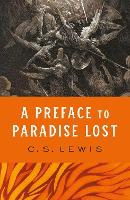


|
|
| book details |
A Preface to Paradise Lost
By (author) C. S. Lewis

|
This book is currently unavailable. Enquire to check if we can source a used copy
|
| book description |
In Preface to Paradise Lost, C. S. Lewis presents an illuminating reflection on John Milton's Paradise Lost, the seminal classic that profoundly influenced Christian thought as well as Lewis's own work. Lewis a revered scholar and professor of literature closely examines the style, content, structure, and themes of Milton's masterpiece, a retelling of the biblical story from the Fall of Humankind, Satan's temptation, and the expulsion of Adam and Eve from the Garden of Eden. Considering this story within the context of the Western literary tradition, Lewis offers invaluable insights into Paradise Lost and the nature of literature itself, unveiling the poem's beauty and its wisdom. With a clarity of thought and a style that are the trademarks of Lewis’s writing, he provides answers with a lucidity and lightness that deepens our understanding of Milton’s immortal work. Also inspiring new readers to revisit Paradise Lost, Lewis reminds us of why elements including ritual, splendour and joy deserve to exist and hold a sacred place in human life. One of Lewis's most revered scholarly works, Preface to Paradise Lost is an indispensable read for new and lifelong fans of Lewis's writing.
| product details |
Normally shipped |
Publisher | HarperCollins Publishers
Published date | 8 Dec 2022
Language |
Format | Digital download
Pages | 192
Dimensions | 0 x 0 x 0mm (L x W x H)
Weight | 0g
ISBN | 978-0-0085-8452-8
Readership Age |
BISAC | religion / christianity / literature
| other options |
|
|
|
To view the items in your trolley please sign in.
| sign in |
|
|
|
| specials |
|

|
Carlo Rovelli
Paperback / softback
224 pages
was: R 295.95
now: R 265.95
|
Originally published in Italian: L'ordine del tempo (Milan: Adelphi Edizioni, 2017).
|

|
Carlo Rovelli
Paperback / softback
208 pages
was: R 295.95
now: R 265.95
|
|
|
|
|
|